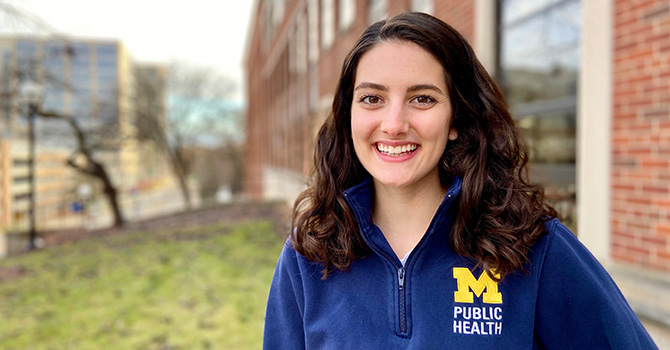Planting Seeds: Hands-On Educational Experiences with Food and Nutrition

Colleen Joseph
Master’s Student in Nutritional Studies, H. William & Elizabeth A. Klare Memorial Scholar
Although she didn't know it at the time, Colleen Joseph's journey to public health started in her family's backyard. "Growing up, I always loved to cook and garden with my mom. Every summer we would plant a big garden in our backyard and I loved learning new ways to prepare our produce each summer.”
These experiences, and the curiosity she formed around food inspired Colleen to dive into a college experience focused on nutritious, home-grown foods. Her curiosity paid off early on when she found her calling. "During my first sustainability class I took freshman year, we had a segment on sustainable agriculture and nutrition and that's when I decided I wanted to major in nutritional sciences.”
I worked with families and communities to improve local healthy food access, and that is when I realized a masters degree in public health is something I wanted to pursue.
She credits her decision to commit to graduate study in public health to the many hands-on opportunities she was able to experience during her undergraduate career at Michigan State University. During the summer of her sophomore year, she was able to intern in Flint, Michigan with the MSU Extension program. “I worked with families and communities to improve local healthy food access, and that is when I realized a masters degree in public health is something I wanted to pursue,“ she says.
Colleen's internship took place while the Flint Water Crisis was gathering national attention. Then, she says, facilitating good nutrition practices in the community was top-of-mind for city and hospital officials. These officials were looking to use food initiatives help mitigate the effects of lead-contaminated water that had already impacted much of the city.
Colleen’s first-hand view of the crisis broadened her perspectives on public health. “I learned a lot throughout my internship, not only about nutrition and the benefits it can have for those who had high blood lead levels, but also about the importance of strong communities and trusted community leaders.” The additional work she participated in during the Extension program with the Edible Flint Food Garden tour allowed her to truly work within a community rather than contributing as an outsider. She says she was grateful to be able to interact with many families, community advocates, and trusted community members while learning about their gardens.
Not too long after, she further enriched her perspectives on health and nutrition farther from home. Participating in a study abroad program in Beauvais, France, Colleen had the opportunity to see how other areas of the world approach health and nutrition. “I learned about specific diets used for patients with chronic diseases while taking nutrition and cooking classes at the University of Lasalle Beauvais.”
These hands-on experiences in real communities early in her educational career informed her approach to her master’s studies. And, she continues to have an interest in the nutrition and equity initiatives being presented in local communities.
“Something I recently learned about was share tables in school lunch rooms - they’re spaces where students can leave unwanted food items for other kids to supplement their lunches with. After knowing how much food is wasted in lunch rooms everyday, I was happy to learn that Washtenaw County is trying to start a toolkit for schools to use to set up share tables. This solution not only helps reduce food waste, but it also helps kids who want or need an extra piece of fruit or milk after lunch.” Looking to the future, she hopes to take this community approach into her work as a public health professional, and eventually as a Registered Dietitian, to help empower individuals in their own healthcare and promote equitable communities.
- Interested in public health? Learn more here.
- Learn more about pursuing an online public health education.
- Read more stories about Nutrition Sciences alumni, faculty, and students.
- Support research and engaged learning at the School of Public Health.
